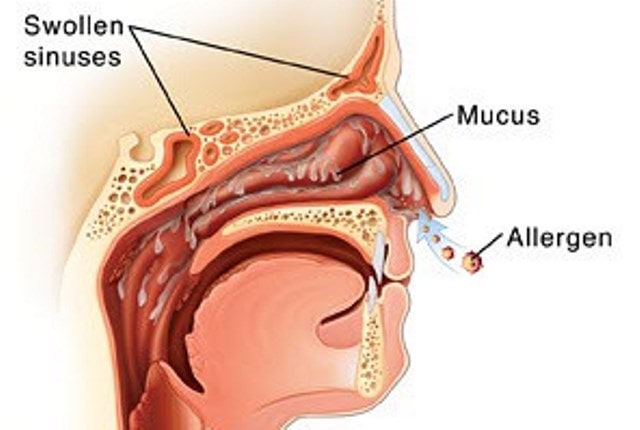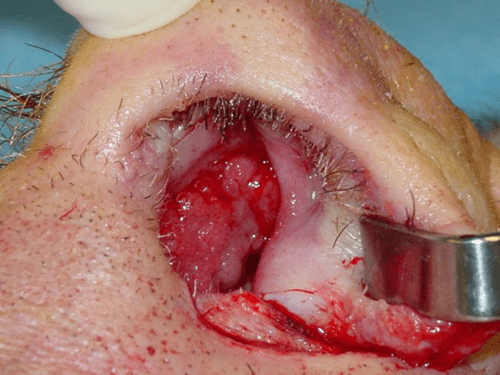What is nasal congestion? What causes nasal congestion? What are some of the symptoms for nose congestion? Read More to find out. We’ll take a look at what causes nighttime nose congestion and what you can do about rebound congested nose bouts.

Often an indication of other underlying conditions such as common cold, flu and sinus infection, a congested or stuffy nose can lead to life threatening respiratory distress in infants in their first stage of life. It can also lead to annoying discomfort in older children and adults. So what is the meaning of nasal congestion?
What Is Nasal Congestion, Meaning
One of the best definitions of nasal congestion is to be found on Wikipedia which states:
It “…is the blockage of the nasal passages usually due to membranes lining the nose becoming swollen from inflamed blood vessels. It is also known as nasal blockage, nasal obstruction, blocked nose, stuffy nose, or plugged nose.” [Wikipedia.org]
A stuffy nose is the most obvious symptom of nasal congestion which occurs when the tissues in the mucous membranes lining the nasal passages become swollen and irritated due to any triggering factor such as allergic reaction due to exposure to allergens, common cold, or due to a bacterial or viral infection.

Such factors lead to inflammation of blood vessels in the mucous membrane, leading to swelling which culminates in this problem as the body produces excess mucus in attempt to flush out the allergen or any other causative factor. We’ll discuss more about causes in the next section.
New born infants typically prefer to use the nose to breathe. Consequently, if a congested nose occurs to infants in their first few months of their life it can lead to a disruption in their breastfeeding habits. It can also lead to life-threatening respiratory problems.
In older children and adults however, nose congestion is commonly associated with annoyance and discomfort only although it can lead to other complications such as interfering with speech hearing abilities and speech development. In some cases, it can disrupt sleep and lead to snoring and is sometimes associated with sleep apnea (sleep disorder that involves slight pauses in breathing resulting in sleep disturbance).
Nasal congestion in children resulting from enlarged adenoids has also been found to cause sleep apnea characterized by inadequate circulation of oxygen and hypoxia and failure of the right side of the heart. The condition can however be resolved surgically by removing the adenoids and tonsils.
A congested nose is also often associated with facial and head pain.
What Causes Nasal Congestion

Now that we know what nose congestion is, the next question is, “what causes nasal congestion?” there are numerous causes!
Viral and bacterial infections leading to common illnesses such as common cold, flu and sinus infection are the most common cause of nose congestion. As the National Institutes of Health reports, illnesses- related nose congestion clears away by itself within one week.
If the your congested nose extends for more than one week, this might indicate the presence of an underlying health issue due to causative factors such as:
- Allergies such as hay fever, pet dander, and dust mite
- Prolonged use of nasal sprays and decongestants (usually longer than three days, a practice that can worsen the nasal congestion more)
- Nasal polyps: non-cancerous growth that occurs on the sinuses and nasal passages due to their inflammation
- Rhinitis
- Chemical fumes
- Environmental irritants e.g. exposure of the nasal passages to harsh weather that is typical of winters leading to a drying out effects on the nasal passages
- Chronic sinusitis
- Deviated septum: Septum is the cartilage tissues that separate the right and left nostrils which are typically located at the center of the nose. Deviation of the septum such that is not placed at the middle of the nose can cause congestion.
- Tumors: these are non-cancerous which can cause nose congestion when they grow inside the nasal passages.
- Pregnancy: A congested nose is also associated with pregnancy. This is typically experienced towards the onset of the second trimester and occurs as a result of hormonal fluctuations and increased blood circulation that is normally observed during pregnancy. These can lead to inflammation of nasal membranes or even cause them to become dry and bleed.
- Foreign objects can also cause congestion and congestion in one side only may be an indication that your child has inserted something into the nasal passage.
Nasal Congestion Symptoms
As we have already mentioned the most obvious symptom of nasal congestion is build up of mucus in the nasal passages which is manifested in a runny nose. Other symptoms are sinus pain and swollen nose tissues.
Nasal Congestion at Night or Nighttime Nasal Congestion
Do you suddenly develop a congested nose as soon as your head hits the pillow? Well, this means that you are experiencing nighttime nasal congestion. It could limit your ability to breathe using the nose and affect your sleeping pattern leading to fatigue in the morning and sometimes headache.
Nose congestion at night can also increase incidences of snoring since it makes the patient to have a tendency to breathe through the mouth while sleeping, thus increasing pharyngeal resistance.
Nighttime nose congestion can be caused by a bout of common cold or flu.
Nasal congestion at night could also be caused by allergies, for example due to the nature of the beddings you use. Allergic reactions can lead to inflammation of the nasal passages which is then manifested in congestion. Such allergies can also be accompanied by other symptoms such as sneezing and watery eyes. Using hypoallergenic pillows and beddings can help.
Nighttime congested nose could also be a sign of dry living environment inside your bedroom. If that is the case, investing in a humidifier and having it running while you sleep could help.
Breathe Right Nasal Strips are also often used to offer relief to nighttime nasal congestion. These typically help to lift your nasal passages to facilitate better and easier breathing as you sleep.
Deviated septum and other structural problems can as well lead to a congested nose at night. Surgery may be required to correct such situations.
Constant Nasal Congestion

Most people, if not all, dread the prospect of getting a nose congestion as it often happens in cold weather as it is typically a disturbing nuisance. The prospect of having to deal with a constant nose congestion is scary is even more. Unfortunately, some patients have to deal with a congested nose in their daily life.
In some people, constant nasal congestion is as a result of structural problems that lead to flawed drainage of the sinuses and surgery may be needed to correct the problem.
Symptoms of such chronic nose congestion may be severe in certain times of the year due to presence of exacerbating factors such as high pollen in the air. Symptoms may also be exacerbated by certain foods, inadequate sleep patterns and other health problems.
Some people may experience constant nasal congestion for several reasons. For example, during pregnancy a patient may have the problem as a result of the hormonal fluctuation and change in blood supply that typically accompany such times.
A constant congested nose may also be due to underlying ailments such as sinusitis, and persistent rhinitis.
It can also indicate constant exposure to allergens such as pollen grain, moulds and pet dander which trigger allergic reactions in the nasal passages which is then manifested in congestion.
Other causes of congestion that we have looked at in the above section can also lead to constant nose congestion which is likely to continue until such factors are eliminated. Some of these include presence of a foreign object in the nasal passage, living or working in a chemical ridden environment, growth of nasal polyps to name but a few.
Rebound Nasal Congestion
What does a rebound nasal congestion mean? This may be a sign of the presence of one or more triggering factors such as pet dander, dust mite and pollen grain among other allergens that may cause allergy in your environment.
If you are experiencing a rebound nose congestion may also indicate an over-use of nasal sprays and decongestants which are known to worsen congestion if used for more than three days.
Some food you consume could also be the underlying cause of rebound nose congestion if they lead to allergic reactions in your body.
The first step in eliminating such a nasal congestion would be to get rid of any potential causative element in your environment and lifestyle. However, if the congested nose seems persistent, you should consider seeking the attention of your doctor.
You should also see a doctor immediately if a congested nose is accompanied by blurred vision; swelling in the forehead, cheeks or eyes; persistent pain in the throat; extended coughing lasting for more than 10 days; and production of yellow-green or gray phlegm in the cough.


